#nouvelle vague of what? boring films?
Explore tagged Tumblr posts
Text
I thought Jean-Luc Godard was supposed to be good
#nouvelle vague of what? boring films?#showing a gratuitous amount of brigitte bardot’s ass doesn’t make a movie good jean-luc
3 notes
·
View notes
Text
La passante de la Place des Vosges/ The Passerby of the Place des Vosges: in praise of Caitríona Balfe
I have recently discussed, in as much detail as possible without becoming completely boring, S's memoir Waypoints. It is, no doubt, an interesting strategic step, aiming to buy much needed time and respite from unwanted fan attention.
But if there is a memoir I would probably read in a very different, almost sentimental way, that would be hers, not his.
We have an enticing idea of the way she writes, with this lesser known essay published by the totemic NYT just a day shy of her birthday, in 2017: The First Time I Left Home (and Fell in Love), which you can read online right here - https://shorturl.at/uTX12. It is a short, dense piece with a deeply personal, even sentimental, view of Paris in autumn and spring. Something very unusual for the feisty, secretive, almost paranoid C we all know and love (admit it, you do: fair's fair). It immediately grabbed both my attention and highlighter.
Writing about Paris, especially from an Anglo-Saxon/American perspective, is a very tricky affair. So much has been said and done, from Janet Flanner's priceless Letters from Paris and Paris Journal, to Anais Nin, to Edmund White, to Hemingway, to Orwell - just to name the ones that immediately come to mind. In this particular case, we'd be dealing with a nice PR fine tuning detail, with a relatively short lifespan, aiming perhaps to reach a more sophisticated demographic than Twitter banter or a three minutes long Q&A about the current season's antics. But a wonderful detail, nevertheless.
The year is 1998. A young 19-year old Irish model wannabe just landed in the chaotic brouhaha of Roissy Airport and the first contact is brutal, language being a considerable barrier. But before that, we are treated to a masterful bistrot snapshot, with a cheeky, self-deprecating sense of humor. I mean how perfect is this?
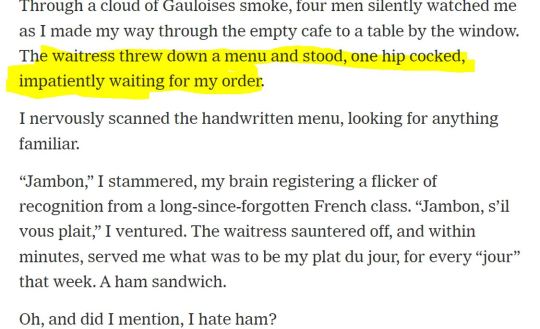
Quite a contrast to the dream version back home:
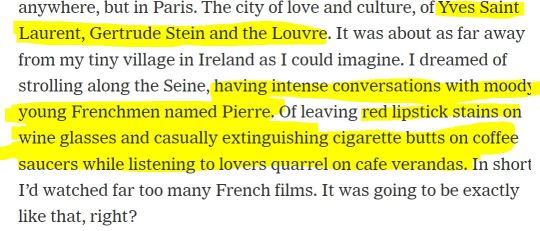
Touché. All the moody young Frenchmen are named Pierre, C. All. Of. Them. As for watching far too many French films, there's always been something very Nouvelle Vague about you, Jeanne Moreau and Jules et Jim & all that, and I have to say this is what I found immediately endearing. I am not talking about Claire Fraser: it is you, emphatically you. The kind of impeccably dressed woman one can find pretending to read Le Monde at Le Café de Flore's terrace in Saint-Germain-des-Prés. The kind of self-evident, celestial creature whose high heels are never heard on any pavement (what is your secret?). Late Jane Birkin didn't even come close, C., mark me. However, red lipstick stains look way better on the rim of a nervously half drunk cup of noisette coffee: but then, that is me.
It was not at all like that, of course, but then something happened just across the street from the Saint-Eustache church, at Quigley's Point, a long gone Irish pub I vaguely remember. Circa 1998, our own boisterous squad used to play darts and get plastered on cheap draft beer and that undignified, syrupy manzana Basque liqueur (idiots, I am telling you, but it was very cheap) at The Bombardier, on the Place du Panthéon, just across the Seine:

Thick brogue, a quick laugh, kind eyes and blonde hair. An interesting combo, for sure. No further comment except well, this is very personal, isn't it? You've said it yourself: sometimes (fun fact: always) the really important people have nothing to do with fantasies. But we know, C, we know.
And then, suddenly, it all falls into place: Stendhal would talk about a crystallization moment. It is that split-second when everything becomes very clear. A pact of sorts occurs and all barriers are lifted. For C, it happened in one of the perfect places of this planet, spare perhaps the Piazza del Campo, in Siena:
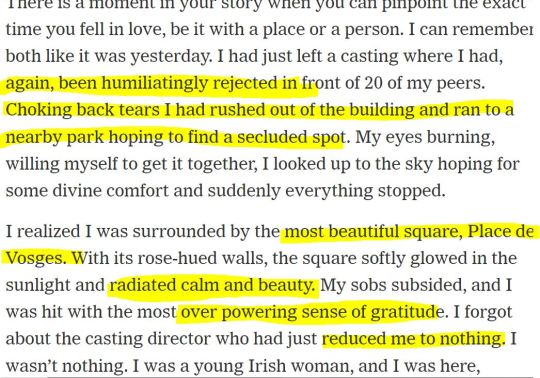
No doubt, by tomorrow evening at the latest, I will be crucified by Mordor, but this made me think of that - different setting and context, same type of seminal moment. Draw your own conclusions:
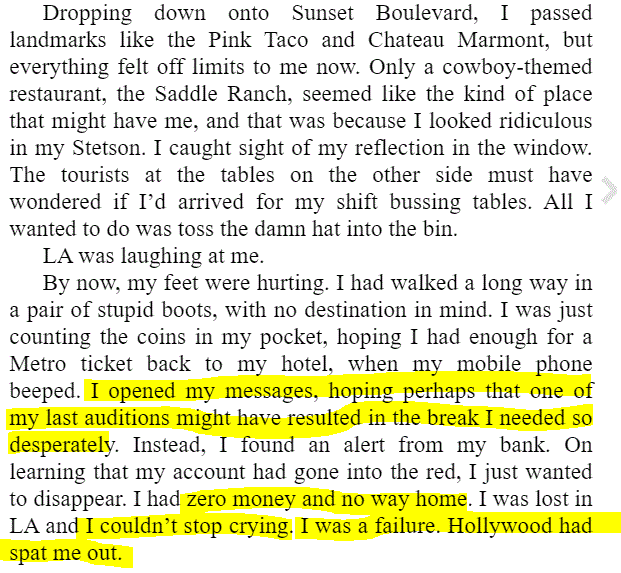
(SRH, Waypoints, Day Four: The Hard Road)
Important things happen, too, Place du Panthéon and this moved me to bits, even if this was not a happy ending. So shamelessly glad it wasn't, by the way:
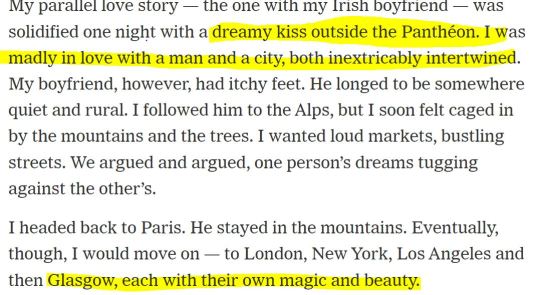
For (and forgive me for ineptly tinkering with your words) "It’s true, you never forget your first love". And for that man on that random pavement in LA, that will always be you, passerby of the Place des Vosges. The wonder you are, despite anything else: it is perfectly irrelevant.
Jacques Brel says it best, in what is almost a prayer:
youtube
94 notes
·
View notes
Text
this is absolutely unrelatable content, but i just wanted to say that the french new wave is boring. very boring. i watched half of just one godard movie and it felt like four hours had passed. nothing happened and then everything happened and theres some jumpcuts. some artsy abstract bullshit was in the middle and the only explanation you’ll get is “you see! it’s a movie! the filmmaker can do whatever he wants and he decided to break conventions by doing this arbitrary thing!” and i mean yeah that’s great but you know what else is great? not watching this
#brunsposts#nouvelle vague sucks ass#you can like it all you want. i still am not gonna praise it#also from what ive seen godard is an old prick who hates phones now or whatever?#anyway catch me watching italian neorrealism. i'd watch bicycle thief for the fifth time before i watched even one nouvelle vague movie#film school rly does give you the perspective that. yes. things can be revolutionary. you can recognize that#while ALSO recognizing that some of those revolutionary movies are as boring as watching paint dry#anyway. i prefer the aesthetic and existential dread of neorrealism because now those are movies without the bullshit
1 note
·
View note
Text
Dune : from a newbie perspective
Last week, I wanted to see the movie Dune by Denis Villeneuve with my mother and she kept saying « I’m afraid I will not understand anything ! ». It sounded weird at my ears since she’s a pretty cultured cinephile. She wouldn’t hesitate to watch an obscure Swedish movie or a really intellectual one from the nouvelle vague. But she was scared of a very popular blockbuster. Even if this could seemed as a paradoxical feeling for someone usually open minded about movies, I can understand the blockage when it comes to Science-Fiction, as I am myself not used to watch this kind of movies.
Sci-fi often comes with a whole universe and specific vocabulary. That’s why it can be hard at first to dive into it. When you see a realistic movie, even if it’s fictional, you can recognize familiar situations. In comedy, drama or romance, the main issues are close to the ones you can experience in your life. You can identify yourself to the characters more easily than if they are part of some alien tribe. Watching a Sci-fi movie you have to accept a brand new world and how it operates, by the suspension of disbelief.
But it would be a shame to not consider this fact : sci-fi is often used as a way to reflect the issues encountered by our own societies. In Dune for example, we can hear a discourse about colonization. On the planet Arrakis you can collect the Spice, a potent psychoactive substance that can be used as an energetic source. Thus, the original inhabitants of Arrakis, the Fremens, are threatened by tribes for other planets that want to make profit from the Spice. We can make a parallel with oil exploitation on Earth, which brings a lot of money only for a little part of the human race. In a metaphorical way, we can find that the subject of the movie can be translated to some modern wandering on ecology, capitalism or equality between humans.
I think what is the most repulsive for someone not used to watch this kind of movie is the amount of the typical vocabulary describing its lore. You have many proper nouns to remember, sometimes in invented languages, and if you’re not focused enough during the beginning of the movie you will quickly be lost and left behind. That’s been what frightened my mom. In Dune, there is a lot of lore’s explanations. The main character, Paul, is really interested in the Fremen’s way of living. Therefore, he watches a lot of documentaries about them. It’s an indirect way to give information about the Fremens to the viewer’s. It is a little bit artificial in my opinion, but it’s also necessary to make everyone able to understand the backstories of the different tribes. But sometimes, a big amount of explanations can be boring for the viewers and it needs to be done cleverly. The easy way, is by doing a voice-over, but because it is the path of least resistance, it has been done many times and now it can feels corny.
Did my mom like Dune ? I’m not sure. She told me after the cinema session that she found it a bit long even if it was visually pleasing. But I think, it also as to do with her snap judgment before seeing it. She felt like she would not like the film and it may have spoiled her experience. For me, I really had to focus on every element to not miss a thing at the beginning but little by little I was getting more into the storyline and i enjoyed even if I did not know anything about Dune before seeing the Denis Villeneuve movie.

Screenshot from Denis Villeneuve's Dune, 2021
0 notes
Text
500th movie celebration
Last month I have quietly passed the 500th movie landmark on my Tumblr, so I decided to make a post with text instead of pictures for a change.
Five and a half years ago, I have decided to create a Tumblr, my own personal space where I would upload film frames, mostly so I could remember all the many movies I watch. By associating an image to a title, it helps to maintain my mind fresh and pinpoint exactly why I loved or despised a certain movie, linking them to the people I have watched them with and the surrounding circumstances.
The criteria is simple but methodical: no more than one post per day, all films I watch are represented even if I am ashamed of having spent time with them, all films are represented only once regardless of the amount of times I’ve re-watched them throughout the existence of the Tumblr.
I like to watch Artsy Avant Garde movies. Trash movies. 80��s “classics”. 70′s sleaze. Documentaries, a whole lot of them. Surrealism. Nouvelle Vague. The occasional Hollywood blockbuster. Skin. I usually get complaints from people about the amount of nudity represented in the Tumblr.
Movies, regardless of how bad they are to the viewer, always mean something special to someone, so I respect them all.
To celebrate the 500th movie landmark, I decided to pick 50 of the ones that evoke the most vivid memories in me. Quality and circumstance were the deciding factors. Random order. I recommend them all.
The Virgin Spring (Ingmar Bergman) - An inspirational exercise on mythology, symbolism, and pacing.
Philanthropy (Nae Caranfil) - Romanian New Wave is my latest passion. This one is a highlight. A very entertaining tutorial on how to scam and be scammed.
Wings of Desire (Wim Wenders) - Poetry in motion. Falling in love every day.
The World is Big and Salvation Lurks Around the Corner (Stefan Komandarev) - A road movie, on a bicycle. Friendship, memory gaps, backgammon.
The Red Turtle (Michael Dudok de Wit) - If a movie makes me cry, it goes to the favorites bucket. The story is simple, the animation is fluid, the outcome is expected. Yet, its message is always powerful.
The Imposter (Bart Layton) - More than a very compelling story of deception and manipulation, this documentary shines due to its brilliant editing. Made me feel pity, anger, compassion and repulse, often at the same time.
American Movie (Chris Smith) - If you love movies, then you cannot skip this documentary about a film director who makes his life mission to finish his crap movie, despite lack of funds, means, and talent. Funny and heartfelt. Highly quotable.
Mustang (Deniz Gamze Ergüven) - Growing up as a woman in traditional Turkey. A feminist look on a closed society. Beautifully shot.
Mad Max Fury Road (George Miller) - A throwback to a time when action movies were being made with a sense of movement and a requirement for suspension of disbelief. Amazing cinematography, highlighted in the recent “Black & Chrome” edition.
Nights of Cabiria (Federico Fellini) - The fruitless search for true love. Finding it, losing it, finding it again, losing it again, getting up, trying again. “Everything I’ve ever let go of has claw marks in it”.
Bicycle Thieves (Vitorio de Sicca) - A masterpiece. The importance of a bicycle as an instrument of survival in 40′s Italy. Puts things into perspective. Nothing can be taken for granted.
Underground (Emir Kusturica) - In my opinion, the greatest Kusturica movie. The sad story of a country that no longer exists.
The Hourglass Sanatorium (Wojciech Jerzy Has) - A very surreal experience where time and space are meaningless. Living in a lucid dream.
Despair (Rainer Werner Fassbinder) - The only Fassbinder movie I ever watched to date. I always want to watch more of him, but somehow keep forgetting. This movie makes justice to it’s title, despair creeps in slowly, but overwhelmingly by its end.
Mary and Max (Adam Elliot) - A claynimation film about friendship and mental health. Funny and melancholic. People should write letters to their friends more.
Blue is the Warmest Color (Abdellatif Kechiche) - A beautiful love story.
The Grand Budapest Hotel (Wes Anderson) - Twee as fuck, like all Anderson’s movies. This man can do no wrong.
Blue Jasmine (Woody Allen) - I have a special interest in movies related with mental health. The last great Woody Allen movie to date.
Grave of the Fireflies (Isao Takahata) - I don’t think I’m exaggerating when I claim that this is the saddest movie ever made. It took me days to recover from the emotional impact it left in me. War makes victims of us all.
Teorema (Pier Paolo Pasolini) - What would you do if you have been touched and subsequently abandoned by Divinity? The final scene is one of my all time favorites.
Forbidden Fruit (Dome Karukoski) - Two girls escape from a oppressive religious cult and experience life for the first time. The scene when one of the girls watches a movie for the first time, in a theater, left a good memory in me.
Forbidden Zone (Richard Elfman) - I like musicals too! This one in particular was scored by Danny Elfman, who also plays the devil in its most memorable scene. A weird freakout of a movie. Specially recommend the colorized version that adds up to the surreal atmosphere.
Enter the Void (Gaspar Noé) - To be seen on a big screen with the best speakers money can buy. Intense psychedelic experience. Stay on the safe side, remain sober while watching this one.
My Best Fiend (Werner Herzog) - I find most of Herzog’s documentaries to be very relaxing. Not this one. Klaus Kinski was a fabled asshole. Werner Herzog is an eccentric lunatic. How these two geniuses managed to work together without killing each other (although both came very close to it) is definitely documentary material. An intense story about friendship, respect, and guttural hate.
The Big Lebowski (Joel Coen & Ethan Coen) - My favorite Coen brothers film. The week from hell on an otherwise quiet and unremarkable life. Improves with repeated viewings.
Mulholland Drive (David Lynch) - Spent years analyzing and trying to make sense out of this movie. I only understood it upon giving up on my quest. My favorite Lynch movie.
Female Convict Scorpion: Jailhouse 41 (Shunya Itō) - 70′s Meiko Kaji is a Goddess. A talent wasted in exploitation movies. Her eyes talk louder than all of the movies’s dialogue. This film is a Pink Women-in-Prison Japanese cheap thrill on surface, but the amount of symbolism and surrealism adds weight to a paper-thin plot. And the title song was borrowed to Tarantino’s Kill Bill. Truly one of my favorite movies ever.
Battleship Potemkin (Sergei Eisenstein) - Soviet Propaganda? Yes. Compelling gut-wrenching story? Yes. Cinematic masterpiece? Yes. Regardless on how you feel about the topic, there is no question that the Odessa steps sequence is a work of art.
The Holy Mountain (Alejandro Jodorowsky) - Watch in on psychedelics, or don’t bother.
Heima (Dean deBlois) - A documentary about Sigur Rós’ return to Iceland. Even for people who are not fans of the band, the landscape is undeniably beautiful.
Django Unchained (Quentin Tarantino) - I am finding the latest Tarantino efforts to be a tad boring on repeated viewings. I usually love them when I see them on cinema, but then abandon them half-way when I try to watch them at home. But this one passed the home test, so it gets my thumbs up!
Disquiet (João Botelho) - Squeezing in a Portuguese movie due for national pride reasons. Not that I care much about those things. But I believe more people should watch this movie. The dialogue is lifted from my favorite poetry book, written by Fernando Pessoa. Heavy, dark, contemplative narrative.
Baraka (Ron Fricke) - There is a particular documentary style associated with both Ron Fricke and Godfrey Reggio that I find very appealing. Visual snapshots of people in their homelands. The silent contrast between traditional and modern. And the omnipresent feeling that all life is meaningless and mankind is a just a random occasion on a ball floating in space. Baraka is the best of all.
Rashomon (Akira Kurosawa) - There is nothing in the World like Kurosawa’s samurai movies, and no better samurai than Toshiro Mifune. Rashomon rises above the other excellent Kurosawa movies by its symbolism and usage of light. A murder story told by four different characters. The truth is somewhere in between the lies.
Dogtooth (Yorgos Lanthimos) - A perverse tale of innocence and isolation.
Gomorra (Matteo Garrone) - Disturbing stories from Napoli’s crime underworld. Realistically shot, no sugar coating, no happy endings, no poetic criminals.
Kids (Larry Clark) - I had this one on VHS, a double feature that also included Trainspotting. Found memories attached to this movie, I saw the actors as a parallel to the kids in my street. Several of the participants in the movie are dead or living miserable lives nowadays. Just like the street kids from my youth.
A Woman Under the Influence (John Cassavetes) - It is not easy to get into this director. And this is a psychological scarring movie. The audience is led to descend into madness like its main character.
Down by Law (Jim Jarmusch) - “I scream, you scream, we all scream for ice cream.”
Daisies (Vera Chytilová) - My most popular post for some reason. An excellent, imaginative, innovative, playful, senseless fun movie to watch.
Taste of Cherry (Abbas Kiarostami) - A man’s quest to end his life. The ultimate taboo.
Black Orpheus (Marcel Camus) - Greek Mythology meets Brazilian Slum. A wonderful, poetic ending makes up for some dull parts in between. Excellent soundtrack!
The Cabinet of Dr Caligari (Robert Wiene) - Insane expressionist film with lovely painted backdrops that add a sense of depth and misdirection to its scenes. Timeless movie experience!
Amélie (Jean-Pierre Jeunet) - Modern Fairy tale. Inspirational. Makes me want to enjoy life more.
Oldboy (Park Chan-Wook) - Part of the Vengeance trilogy, I picked Oldboy because I now realize that I haven’t seen Sympathy for Lady Vengeance again ever since I started this Tumblr. Both films are excellent tales of twisted revenge. Oldboy’s fight scene has inspired a generation of copycats.
Spring Summer Fall Winter... And Spring (Kim Ki-duk) - Episodes of the life of a Buddhist monk, from childhood to old age. The wheel of life and rebirth. As Buddhist as it gets.
Fear and Loathing in Las Vegas (Terry Gilliam) - This got me into Hunter Thompson. There’s no such thing as too much drugs.
Battle Royale (Kinji Fukasaku) - A high school class is taken to a remote island and instructed to kill each other until only one survives. Classic 80′s video game plot, tickles the nostalgia bone just right without resolving to remakes and rehashes. Incredibly fun!
House (Nobuhiko Ôbayashi) - A horror movie, a comedy, a fever dream, an art-house lysergic extravaganza. Don’t know what to make of this movie, just that watching it is an amusing experience.
Band of Outsiders (Jean-Luc Godard) - I love all Anna Karina’s movies with Godard, so it’s hard to pick one. I went with Band of Outsiders because of its dance sequence. Godard had fun while experimenting with filming techniques, and this feeling is contagious to the audience.
Thanks for reading and sticking around.
4 notes
·
View notes
Text
Movements and Technologies
Lecture Series: 'Aesthetics and Technologies [FILM101]'
In collective art history, there have been many art movements designed to recreate the rules of traditional art. Many artists find themselves interested in new ways to express themselves through these new notions and meanings in specific movements as the develop. Manifestos are the physical 'manifest' of the rules a movement may put forward, or sometimes, not of a movement but for documentation of certain rules put forward for the sake of the artist.
One great example of a movement that was designed to change the ideals of the 'current' art society was French New Wave / Nouvelle Vague, in which french filmmakers disregarded the traditional norm of french film which consisted of boring adaptations from 'safe' stories that François Truffaut coined as 'la cinéma de papa' in his essay 'Une certaine tendance du cinéma francais'. The notion of french new wave was developed in the magazine 'Cahiers du cinéma' co-founded by André Bazin. Bazin and Henri Langlois as the father figures of The French New Wave both thought highly of the author in the filmmaking process, they believed that the director creates a signature within their films. Andrew Sarris (an American film critic) called this 'auteur theory'.
The French New Wave is very much involved with experimentation in the narrative, editing and style of the film. Much of the time filmmakers would touch upon subjects that were currently affecting the society in France at the time. To put forward the style in a filmic sense, filmmakers used more lightweight and mobile filming equipment which incorporated film stock with sound and less need for light. Because of the documentary-esque filming, many of the films created were a combination of have a film with no 'end' and realism.
Upon looking into the French New Wave, films such as 'Man Bites Dog' (1992 - Rémy Belvaux) and 'La Haine' (1995 - Mathieu Kassovitz), 'Night and Fog' / 'Nuit et Brouillard' (1955 - Alain Resnais) intrigued me a lot. Although some may not be the epitome of French New Wave, they're astonishing developments from the movement and each are inspiring for their style and portrayal of the events at play. For example, Night and Fog follows a poetic rhythm and visual style with Michel Bouquet narrating true events and recounts of the holocaust and the Nazi Regime. It is all presented in beautifully grotesque and macabre fashion as horrific images of a mountain of women's hair and a bucket of severed heads lay at the viewer's disposition. Images that will be retained for centuries.
Surrealism developed from Dadaism in the early 1920s’, André Breton wrote two manifestos that were issued and drafted another, Yvan Goll wrote the third manifesto (which caused backlash and argumentation between Goll and Breton). Breton is thought to be the father of surrealism as he was also involved in the Dadaist movement, he put forward the definition of surrealism as:
Dictionary: Surrealism, n. Pure psychic automatism, by which one proposes to express, either verbally, in writing, or by any other manner, the real functioning of thought. Dictation of thought in the absence of all control exercised by reason, outside of all aesthetic and moral preoccupation.
Surrealist artists relied heavily on the unconscious and automatism for material and the structure of Surrealism. Automatism meaning the artists could create without have to actively have a subject of sorts or to have reasoning behind their work. Salvador Dalí, Max Ernst and René Magritte have created many pieces of work that represent Surrealist ideals at their most potent.
Examples:
‘The Son of Man’ (1964) - René Magritte
‘The Persistence of Memory’ (1931) - Salvador Dalí
‘The Eye of Silence’ (1943-1944) - Max Ernst
Alongside art, Surrealists utilised film to create stunning pieces of work that could articulate differences, changes and dreams more effectively. Essentially, film is one of the more favored options of medium as surrealism is so difficult to portray in still images or texts, due to its complexity and nature of being past time and space in dreamlike worlds with unconscious reasoning.
The French New Wave and Surrealism contributed an astonishing amount of material to both the art and film world, also to society in general. Any artists who want to break the boundaries of their traditional rules and guidelines can create their own manifestos and produce extraordinary pieces of work that bend what is expected of them.
0 notes
Text
Pierrot Le Fou/Crazy Pete (1965)
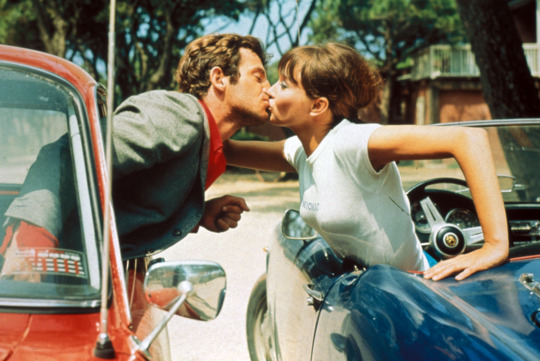
A film by Jean-Luc Godard is always an experience. In almost every shot, the director does something special to stimulate the viewer. Something cinematic, something in the "mise-en-scene", something that goes against the rules of (the continuity of) filmmaking. Sometimes the "fourth wall" is suddenly broken through because the characters suddenly stare directly into the camera in order to cast the audience a glance.
Godard's tendency to cover as many topics as possible and different styles appears in his later films. Pierrot le fou is almost consistent in its inconsistency but it is also a complete whole. There is a plot: A married man, Ferdinand, escapes his everyday existence with his mistress Marianne leaving behind, as they are chased by gangsters that are after Marianne, a trail of death and destruction.
Pierrot le fou is thus a kind of road movie, or perhaps a real Odyssey. Ferdinand, played by Belmondo, is cool in a Belmondo kind of way, and Marianne, played by Karina, is beautiful and fragile in a Karina way. The two communicate badly, perhaps a metaphor for the divorce between Godard and Karina in real life. Nevertheless, Pierrot le fou was the sixth Godard film in which Anna Karina appeared.
The story seems less important, though the themes that it covers do appear throughout. 'Pierrot le fou' is therefore not an incoherent film without content, which only means a style exercise. Godard's well-known philosophical speculation is again well represented, while the film has a mildly melancholy yet amusing atmosphere as it explores the subject of the illusion of love and romance. At the same time, the style of the film is one of it’ greatest forces and what makes it’s fascinating.
"Everything you need for a movie is a gun and a woman," Godard is said to have said once (although he’s denied that he ever said it), and these elements are, in any case, again well represented in 'Pierrot le fou'. And at the same time. The image of a fragile beauty in an airy summer dress that runs over a roof with a big gun is a fascinating combination.
In addition, Godard, of course, wanted to put his wife Anna Karina in the spotlight, in the role of Marianne. And pistols come back regularly because of the crime scene in the film.
A storyline - in the style of Bonnie & Clyde - swapped somewhere halfway through the film for a Jules Verne-like paradise. When Marianne literally says, "And now we have to go back to our crime story with guns and villains", after which they suddenly drive to their car and literally put the film in another gear. As a viewer, you are constantly made aware that you are watching a film. Of course, this is not permitted, according to the unwritten rules of cinema, but not allowing something is prohibited in his films.
Ferdinand, Marianne’s lover, named Pierrot Le Fou by Marianne, is played by Belmondo who is once again his familiar, cool self, the quasi-nonchalant, a slightly cynical man with a cigarette dangling from his mouth, as in Godard's best-known film 'À Bout de Souffle’ (’Breathless).
And Anna Karina is always her charming self and works that seemingly effortless magical, lively energy of hers on the camera. Now I find that most reviews of any film of Godard focus more on the male actors than they do Karina.
But the truth for me has always been that she steals the show seemingly more naturally and effortlessly than anyone else, and the same film would without her not have the same spark, why do people generally watch them? Often the answer will be: because of Anna Karina, because seemingly anyone male or female, can’t help but develop a cinematic crush.
Also, some have speculated that she’s actually not that good an actress, well that’s very easily disproven by just how many emotions she can convey with just her face; she can cast a furious look, just as well as a sly smile with the same ease.
Pierrot le fou' is best seen as a collection of scenes in their own right, each of which has something unique. Sometimes there is special color use, such as shots that are full of red or blue, or a nightly car ride accompanied by switching neon lights a scene that might have inspired the rainy ride in Dario Argento's 'Suspiria'.
Sometimes there is a song and dance number - in the middle of the room or in the forest - as in a musical, and at other times, sound or music is used remarkably, for example by playing up the volume or suddenly stopping the soundtrack.
It's funny too when a confusing element appears that stimulates and raises questions, but it never, or only later, becomes clear what they meant and how they bore relation to one another, they’re truly moments that seemingly make no sense at the time and that you have to let wash over you.
This is the case when Marianne crosses her apartment to get to her bed where Ferdinand is smoking a cigarette and passes another bedroom in which a dead man is lying on a bed. This is just visible and no attention is paid to it. Marianne first talks with Ferdinand, and only later becomes aware of the man, and the viewer suddenly sees that all sorts of guns are strayed about the apartment.
The movie also contains a lot of humor, physical humor and verbal humor in the form of dry remarks, such as: "It's good that I don’t like spinach. Otherwise, I’d eat and I hate the stuff.” But also, it’s often interesting because of the philosophical speculations that Godard expresses through his characters.
Just as in "Vivre Sa vie", the status and value of thoughts and words are discussed here, and love is analyzed from the difference in communication between men and women, in which words and feelings sometimes seem to collide, although both contain ideas, says Marianne.
Godard was the most political of the Nouvelle Vague movement, and that is also apparent in this film. The radio brings messages from Vietnam, and to earn money, Ferdinand and Marianne play a play about US soldiers in Vietnam for tourists. But despite the political burden, Pierrot le fou is especially an intriguing film, in which Godard again shows why he belongs to the greats of French cinema.
In short, 'Pierrot le fou' intrigues on many levels. A conventional, coherent story is not what you should expect here, but whoever wants to see a director who manages the art of cinema perfectly and wants something to think about after, has an excellent choice in ‘Pierrot Le Fou’.
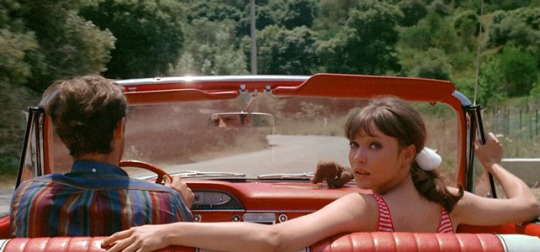
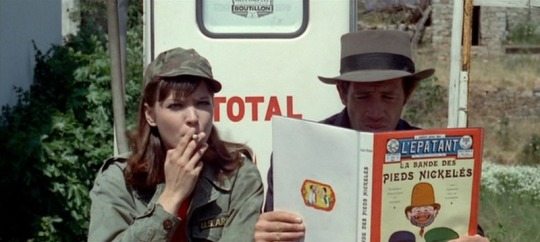
“Look at the sea, the waves, the sky. Life may be sad, but it's always beautiful!”
#pierrot le fou#pierrot le fou 1965#pierrot le fou movie#pierrot le fou film#french new wave#nouvelle vague#french cinema#european cinema#60's cinema#vintage#vintage cinema#anna karina#jean luc godard#jean-paul belmondo#movies#films#movie review#film review#cinema#filmista
16 notes
·
View notes
Text
Review of Jean Vigo's "L'Atalante"
I first appreciated Jean Vigo’s “L’Atalante” when I watched it as part of the “Cannes Classics” 2017 programme. And by that I mean that there is a possibility I have watched it before and not have understood (despite my many years in Paris doing Film Studies, unfortunately…). For those who do not know, “Cannes Classics” is a part of the annual Cannes Film Festival. It was created around fifteen years ago in order to honour cinematographic classics and the various restoration works done to them at a time when the history of cinema seemed threatened by its entry into the age of digital technology. “L’Atalante” features on many best-of lists and its filming and editing techniques, considered ahead of its time, have later inspired many of the directors of the Nouvelle Vague. The film was heavily mutilated for commercial release in the past and once even had another title, “Le chaland qui passe”, “The barge that goes by” in English, sharing its name with a song by Lys Gauty, very popular at that time. This song does not appear in the film, which instead features musical compositions by the brilliant Maurice Jaubert. Cinematography is done by Boris Kaufman, the brother of Dziga Vertov and also the cinematographer on Jean Vigo’s previous works. It is the fourth and final film of the director, who was so sick at the time of post production that he sometimes had to edit the film from a stretcher. He died from tuberculosis shortly after the premier of the film in 1934, at the young age of 29 years old. The cast includes the legendary Dita Parlo and the prolific Michel Simon. Despite its liberal façade, “L’Atalante” is a film that explores the difficulties of conjugal love. A newly-wed couple, Jean and Juliette, played by Dita Parlo and Jean Dasté, decide to live on Jean’s canal boat, “L’Atalante”, after their marriage along with the boat’s crew, the elderly Père Jules, played by Michel Simon, and his cats and a younger cabin boy. All starts out good but soon telltale signs of marital problems start to appear. The bride seems to find her married life on board stifling thus when “L’Atalante” arrives in Paris, she is thrilled. The couple leaves the boat for a tour of the city, which comes abruptly to an end when Jean becomes jealous of a peddler’s attention on his wife. Soon after their return on the boat, Juliette slips away to the city and feeling betrayed, Jean leaves without her. Juliette finds herself lost in a city that is now foreign and even unsafe. Eventually Père Jules sets out to find Juliette and with the two lovers reunited, “L’Atalante” continues its journey. I have to admit that I had a difficult time writing the synopsis because the film seems more about subtexts than an actual story. The beginning of the film, featuring the banalities of married life and slowly revealing the flaws in each character, serves well in setting up the premise but pales in comparison to the later parts of the film, with perhaps the two greatest scenes of visual poetry in cinema history, the dream-like sequence of Juliette underwater and the sequence which alternates between the two lovers tossing and turning in their respective beds while they are physically apart but visually “put together”. It is here, through Jean Vigo’s metaphorical portrayal of heartache and daring hint at erotism (rare for French cinema at that time), that we finally understand and feel the love shared by Jean and Juliette. Michel Simon steals the limelight as the eccentric Père Jules. The actor successfully immerses himself in the numerous façades of his character – the cat lover, the old sailor battered by life experiences and even a possible love interest for the bored Juliette and finally gives his best performance when he demonstrates to the couple what he knows about wrestling. With “L’Atalante”, Jean Vigo showcases his mastery of cinema, a skill that has been adulated and imitated through the years but never surpassed. Unfortunately while he was still alive the director never received the fame that he so deserved despite his professionalism and talent but was instead hugely restricted by censorship and other demands from his producers (a time which ironically the notion of “auteur” does not seem to exist in France). Hopefully the fact that he got to work with the few of the industry’s greatest assets at that point of time, Maurice Jaubert, Boris Kaufman and Michel Simon was good enough a reward for the cinéaste and judging from his passion for his art, it probably was.
0 notes